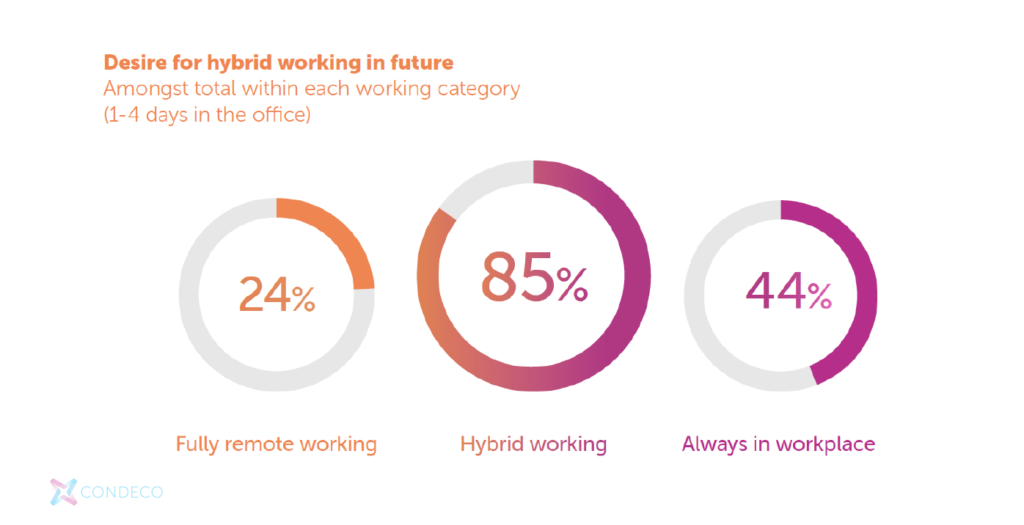
Hybrid working is far from a new concept, but as it rapidly becomes one of the most talked-about subjects in boardrooms and business publications, it certainly can feel like it is. In reality, the idea of flexibility around home and office working has been talked about for decades, and adopted by many thousands of businesses in that time. And, without tooting our own horn too much, Condeco has been engaging in the steady progression toward more flexible workspaces from the get-go.
Of course, we all know that only in recent years has it become a topic that really dominates agendas. Hybrid working has finally gone mainstream and is being seriously considered by even the most skeptical business leaders.
Still, it’s fair to ask whether the rise of hybrid is based on an actual change in attitudes. Do people really want hybrid working more than ever, or is this shift based on an overrepresentation of the topic in news stories and trend pieces? Our recently published Attitudes on Hybrid Working report provides some answers.
How attitudes have changed

Our research indicates that employees are learning the value of flexible models after having the opportunity to experience it:
- 85% of people who are now hybrid working want to continue with this model in future.
- 44% of people who are currently always in-office wish to move to a hybrid working model.
It is also worth noting that 24% of people who are currently working fully remotely want to switch to a hybrid model. All these findings show us that there is a real desire out there for a mixture of office and home working, not just 100% of either.
From the employer perspective, it seems many of the common misgivings around remote work have lessened:
- 80% of managers now trust employees to work virtually, and have found that their productivity is just as good when working remotely as it was in the office.
- 78% agreed that the pandemic showed them that the way they conducted business could be streamlined.
In short, managers have seen hybrid in action and now have the proof they need that flexible models can work.
Why have attitudes changed?
Forced into it?
Is this changing attitude down to sheer pragmatism? It could be argued that hybrid working is now more popular simply because it can promote a more productive, happier business. In the past, a lot of flexible working requests were denied due to it being “impractical” for people to work anywhere other than the office.
The pandemic forced offices to adapt almost overnight and the results showed benefits to many in terms of productivity and cost reduction. So, despite being forced into the move initially, many would now question why they should return to a less productive way of working.
The definition of a meeting
The idea of having highly important meetings from multiple locations would have been unthinkable two or three years ago. Now it is almost the norm. This could be because it has become so much easier to organize remote meetings. The days of unreliable video conferencing and patching people into phone calls has been replaced by the ease of Zoom and Teams.

This remote approach has largely become a choice rather than a need. At the same time, the benefits of face to face meetings are being more carefully considered with many realizing that there is a time and a place for people to get together in person. The good news is that technology, such as Conceco’s workspace booking software, has developed to make either option far simpler.
Health and safety
The benefits that hybrid working provides employees could also be a major driver toward changing attitudes. Our research shows that 7 in 10 employees agree that the opportunity for flexible work shows their company cares about employee emotional and mental well-being. In turn, employees are happier and feel more loyal to their company — a major win for talent acquisition and retention.

The work-life balance
A balanced life is something that has always been talked about, but it has become even more important since the impact of the pandemic. It has been shown that flexible work can happen and delivers on work-life balance, so employers are happy to adapt and help their staff find that balance. After all, according to our report, 69% agree that hybrid working demonstrates that a company is taking into account the emotions and mental well-being of its employees.
Helping you with changing attitudes
If you’re ready to embrace hybrid working as the future — and your employees no doubt are — Condeco can help you navigate a seamless transition for your workspace. From fully integrated meeting booking to improved visitor management, we’re here to help you achieve the office of tomorrow, today.



